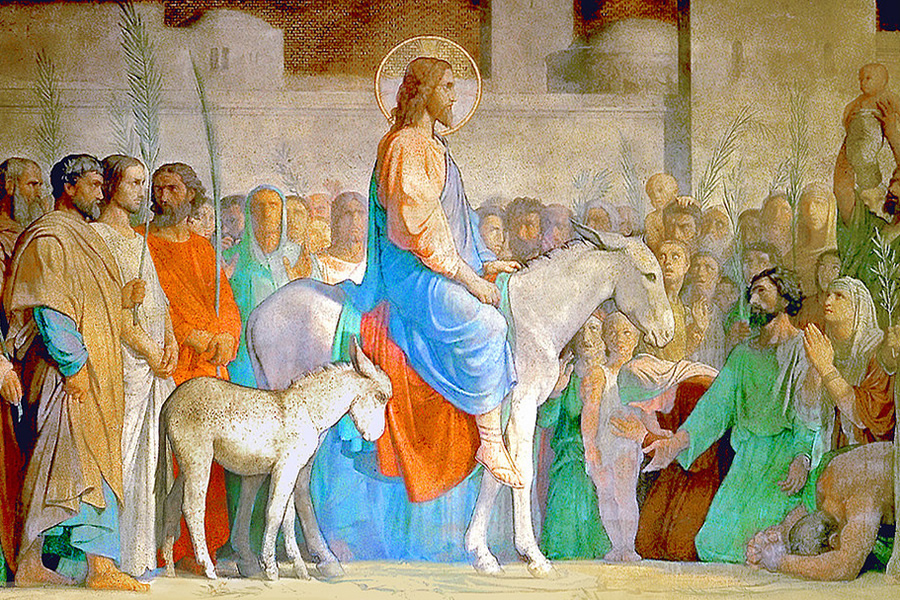
Palm Sunday of the Lord's Passion
03-23-2024Gospel ReflectionKathryn MulderinkWhat more can be said about today’s Gospel? We hear the proclamation of this Gospel in several voices, to help us enter into these final days of Jesus’ earthly life. The scheming of the chief priests and scribes before the Passover, the woman with the alabaster jar of oil prefiguring the anointing of his body for burial, Judas’ plan to betray him, the Last Supper and Jesus’ knowledge that he would soon be betrayed, the institution of the Eucharist so that he could remain with us until the end of time, Jesus’ prediction that the apostles would be scattered and their faith shattered. And then, all the events of Jesus’ profound Passion and Death.
We see his generous Heart, his agonizing Heart, the Heart that moans silently for someone to keep vigil with him for even an hour, the Heart that does not hesitate or draw back from the terrible execution for love of the Father and of us. Throughout all this long suffering, we see Jesus remaining steadfast before the will of the Father and concerned with consoling and strengthening those around him.
We also hear Jesus cry out the first words of Psalm 22: “My God, my God, why have you forsaken me?” While we hear in that cry of his Heart the depths to which he was allowed to sink – to the sense of being forsaken by the Father, to the brink of despair – the psalm is really a painful prayer of hope. Jesus has certainly not given up on his relationship with the Father. He has not let go. Psalm 22 (which those at the foot of the Cross would have known well) begins with an accurate description of the scene on Calvary, from the vicious attack of Jesus’ enemies, to the details of the suffering he endured, to the dividing of his clothes. But the psalm then reaches out to God to come and deliver, to save him from this torture, and then moves on to praise the Lord. In his utter agony, Jesus enters into our own suffering and reminds us to cling to hope and to continue to offer praise.
While part of Psalm 22 was heard today as the Responsorial Psalm, we might pause to pray the whole psalm some time during this Holy Week; it is a profound meditation on the words of Jesus’ own agonizing Heart from the Cross. It gives us a glimpse of how low he descended into our own suffering, to redeem every last bit of physical, emotional, psychological, and spiritual pain for us.
In His Cross, because of the Resurrection, we are all freed to bear our own crosses with love and hope.
Domingo de Ramos de la Pasión del Señor
¿Qué más se puede decir sobre el evangelio de hoy? Escuchamos el anuncio de este Evangelio en varias voces, para ayudarnos a entrar en estos últimos días de la vida terrena de Jesús. Las intrigas de los sumos sacerdotes y los escribas antes de la Pascua, la mujer con el frasco de perfume con nardo que prefiguraba la unción de su cuerpo para el entierro, el plan de Judas para traicionarlo, la Última Cena y el conocimiento de Jesús de que pronto sería traicionado, la institución de la Eucaristía para que pudiera permanecer con nosotros hasta el fin de los tiempos, la predicción de Jesús de que los apóstoles serían dispersados y su fe destrozada. Y luego, todos los acontecimientos de la profunda Pasión y Muerte de Jesús.
Vemos su Corazón generoso, su Corazón agonizante, el Corazón que gime en silencio para que alguien vigile con Él aunque sea una hora, el Corazón que no duda ni retrocede ante la terrible ejecución por amor al Padre y a nosotros. A lo largo de todo este largo sufrimiento, vemos a Jesús permanecer firme ante la voluntad del Padre y preocupado por consolar y fortalecer a quienes lo rodean.
También escuchamos a Jesús gritar las primeras palabras del Salmo 22: “Dios mío, Dios mío, ¿por qué me has abandonado?” Si bien escuchamos en ese grito de su Corazón las profundidades en las que se dejó caer–hasta sentirse abandonado por el Padre, al borde de la desesperación–el salmo es en realidad una dolorosa oración de esperanza. Ciertamente Jesús no ha renunciado a su relación con el Padre. No lo ha soltado. El Salmo 22 (que aquellos que estaban al pie de la Cruz habrían conocido bien) comienza con una descripción precisa de la escena en el Calvario, desde el feroz ataque de los enemigos de Jesús, hasta los detalles del sufrimiento que soportó, hasta la división de su ropa. Pero el salmo luego se acerca a Dios para que venga y lo libere, para salvarlo de esta tortura, y luego pasa a alabar al Señor. En el momento de su inmensa agonía, Jesús entra en nuestro propio sufrimiento y nos recuerda que debemos aferrarnos a la esperanza y continuar ofreciendo alabanzas.
Si bien escuchamos una parte del Salmo 22 hoy durante el Salmo Responsorial, podríamos hacer una pausa para rezar el salmo completo en algún momento durante esta Semana Santa; es una profunda meditación sobre las palabras del propio Corazón agonizante de Jesús desde la Cruz. Nos da una idea de cuán bajo descendió en nuestro propio sufrimiento, para redimir hasta el último fragmento de dolor físico, emocional, psicológico y espiritual por nosotros.
En Su Cruz, gracias a la Resurrección, todos somos libres de llevar nuestras propias cruces con amor y esperanza.
BACK TO LIST